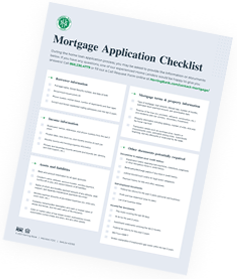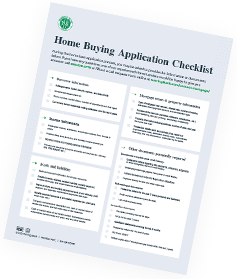Before approaching a mortgage lender and starting a mortgage loan application, you can…
Benefit from understanding the basics of what a mortgage is, what options you have, and the best way to get started.
1. What does it mean to be pre-approved or pre-qualified and do I need to be both?
2. How does your credit score affect your home loan interest rate?
3. If you have a low credit score you can still buy a home, here’s how
4. What is mortgage insurance and how can I avoid it?
5. Choosing the best mortgage loan for you
6. It can be challenging to keep up with everything – here’s a checklist to keep things organized
For example, do you need to get pre-approved or pre-qualified? How much does your credit affect your rate? What are the different loan types and which one would be best for you?
It’s a lot when this isn’t your day job.
Our goal is to make it just a little easier and a bit more digestible for you so you can sail through the mortgage process without a worry.
For example, to get us started…
What does it mean to be pre-approved or pre-qualified and do I need to be both?
Before you begin your home buying journey, make sure you’re up to speed about what it means to be pre-approved for a mortgage, why you should get pre-approved, and the pre-approval process.
Terms like pre-approval and pre-qualification may sound like the same thing, but there is a difference between the two.
Once the mortgage lender has received your information and processed it, you will either be approved or denied for a home loan.
If approved, the lender will inform you how much they are willing to loan you, as well as provide you with various mortgage rates and down payment options.
How does your credit score affect your home loan interest rate?
The interest rate on a mortgage loan is one of the factors that determine the amount of your monthly payment.
Loan payments are made up of interest and principal (the amount of money borrowed). Over time, monthly interest payments added to your principal amount can add up to a large sum of money.

This is why a low-interest loan is highly attractive to a home buyer, as it results in you paying less to use the borrowed money over the life of the loan.
The interest rate that you qualify for will depend, in part, on your credit score, as this score is a means of determining the likelihood of your repayment of the loan based on your past credit actions.
Another way to look at the connection between your credit score and how it affects your rate is by approaching it from a more personal perspective, such as if you have ever loaned money to a friend or family member.
If that person was slow to pay back the money — or didn’t repay it at all — you are probably reluctant to lend them any funds in the future.
The same is true of financial institutions.

They are more willing to lend money to a person with a record of paying creditors on time. That’s why, when deciding whether or not you are a good candidate for a mortgage loan, a lender considers your credit score.
Your credit score is a measure of your financial health and indicates to lenders their level of risk in lending money to you.
A high credit score
A high credit score suggests that you are likely to repay your loan on time and may qualify you for the best — lowest — interest rate offered by that lender.
A low credit score
A low credit score suggests that you might submit late payments or even potentially default on the loan. In this case, a higher interest rate is offered to offset the lender’s risk.
Your credit score is most often calculated using the FICO scoring model
It is derived from information compiled by credit reporting companies.
Your personal credit reports at these companies include a history of your repayment habits regarding money you have borrowed or purchases you have made using credit.
Credit scores range from 300 to 900; a credit score above 700 indicates that you manage credit well and a lender is likely to be comfortable making a loan to you. A credit score lower than 700 indicates that you may have mismanaged your credit, making you more of a risk to a lender.
If a lender lends money to you despite a low score, you may be required to pay a higher rate of interest on the loan.
How your score can affect your loan
A difference of only a few points on your credit score can add hundreds of dollars to the cost of your mortgage due to the assignment of a higher interest rate to your loan.
For example, a 30-year, $220,000 loan at a 4% interest rate without any other fees would have monthly payments of approximately $1,050.
30-year fixed conventional
at a 4% rate equals aHowever, the same loan at a 5% interest rate would have monthly payments of $1,181. The difference of $131 per month adds up to $1,572 extra paid on the loan – in interest alone – in a year’s time.
30-year fixed conventional
at a 5% rate equals aRaise the interest rate to 8%, and you have a mortgage payment of $1,614 — an extra $564 per month over the 4% rate. Over the life of the loan (30 years) this is an additional $203k in additional interest that you would pay at 8% versus 4%.
30-year fixed conventional
at a 8% rate equals aStart now, before purchasing a home, to take steps to boost your credit score.
Pay bills on time each month.
If you do hold a balance on your credit cards, strive to maintain balances below 30% of the available credit amount.
While there are other options available to lower the interest rate on a potential mortgage loan (such as having a larger down payment or paying a fee for a discounted rate) a strong credit score will go far in setting you up for a competitive mortgage loan rate.
If you have a low credit score you can still buy a home, here’s how
While credit is a major factor of your mortgage loan, it is definitely not everything.
Whether you are a first-time home buyer looking to finally take the plunge, or a seasoned homeowner hoping for a change, it pays to understand your full range of financial options.
Try FHA loans
FHA loans are approved by the Federal Housing Administration. They allow borrowers increased access to lower interest rates, which are insured by the federal government.
This reduces the risk for lenders and gives those buying a house more options and flexibility in their spending.
FHA loans offer much lower down payments for those that are accepted and can be as low as 3.5% of the loan total. The FHA can cover borrowers whose credit score is at least 580. For those who want to seek these benefits, but have a lower credit rating, the FHA recommends a Consumer Credit Counseling program to avoid getting denied a loan.
You can learn the in’s and out’s of FHA loans later in this guide, click here to skip to it.
Accept higher interest rates
Dealing with the reality of higher interest rates on your loan will be important for most people purchasing a house with less than perfect credit.
It’s not ideal, but there are ways to work this challenge into your family’s finances.
Saving up and making a larger down payment will save on interest and smart budgeting will allow you to pay your mortgage off faster.
In any case, understanding how to budget for your home loan payments is key for anyone – good or bad credit.
Explore all options
Some home sellers take on the role of lender and provide seller financing options.
This is a line of credit directly between the buyer and seller of the house that is used to facilitate some transactions.
Although only about 10% of sellers will be interested in exploring this option, it can serve as an excellent alternative when traditional loans are unavailable.
If all else fails, sometimes the best option is to hold off for a couple years in order to save money and improve your credit.
The credit boost gained in two years can often mean the difference between an affordable interest rate and one that is unmanageable. Having the ability to pay more up front will mean lower house payments overall.
What is mortgage insurance and how can I avoid it?
With an upfront fee and monthly installments, mortgage insurance is an added expense you need to consider when purchasing your new home.
It may just make or break your purchase decision. Here’s what you need to know about it.
What is mortgage insurance?
Though it’s paid by the borrower, mortgage insurance protects the lender in case the borrower defaults. It’s insurance for the lender, not you.
Why do lenders charge mortgage insurance?
Loaning money to anyone is a risk, and lenders lower that risk by charging borrowers for mortgage insurance.
Though mortgage insurance makes home buying a little less appealing, it nonetheless makes it more available to many Americans by making the qualification process easier. With it, many are able to qualify who would have once been denied.
It might seem contrary to what you would think, but anyone who is unable to put 20% down is the real benefactor of mortgage insurance.
Are there different types of mortgage insurance?
Yes, but not really. Depending on what loan you use to purchase your house, there is a different nomenclature for the mortgage insurance. In essence, they’re all basically the same (though some come with higher rates).
Does mortgage insurance go away?
PMI, which applies to conventional loans, will automatically go away after you reach 22% equity (or 78% LTV); however, you can request for it to go away once you’ve reached 20%.
For FHA loan mortgage insurance, MIP exists for the entire span of the loan. If you want to get rid of it, you’re going to have to refinance to a non-FHA loan.
Another option (for non-FHA loans) is to get your house reappraised. If your home’s value has raised significantly enough, your lender may consider dropping PMI.
How do I avoid mortgage insurance?
The only way to avoid mortgage insurance is to make a 20% down payment or to use a second mortgage.
Known as a piggyback loan, you take out a loan for 80% of the purchase price and then take out a second loan to cover the remaining amount.
Doing this, you have to make sure that the combined mortgage payments are not higher than the cost of a single mortgage with insurance. Typically, second mortgages come with higher interest rates, so you’ll definitely want to do the math before you decide!
Choosing the best mortgage loan for you
Before approaching a lender and starting the process of filling out a mortgage loan application, you can benefit from an understanding of the different types of mortgages available and the advantages and disadvantages of each.
How do USDA loans compare to other loans?
Assuming you want to buy in either a rural or suburban area, and you meet the income limits, here are some things to consider when choosing a USDA loan over a FHA loan, conventional loan, or VA loan.
USDA Loan vs. FHA Loan
The interest rate is normally .5% higher for an FHA loan. USDA loans also come with 100% financing, meaning you don’t have to make a down payment. FHA loans require 3.5% for credit scores 580 and above and 10% for scores 500-579.
USDA Loan vs. Conventional Loan
The USDA loan requires a higher credit score of 640, but that does not mean you can’t get a USDA loan if it’s lower. Conventional loans usually require a credit score of 620, but that depends on the lender.
USDA Loan vs. VA Loan
For a VA loan, you must have served in the U.S. military. Both offer zero down payment options. However, with VA loans, there aren’t any income limitations nor are there purchase area restrictions.
It can be challenging to keep up with everything
During the home loan application process, you may be asked to provide a wealth of information or documents.
Get a jump start by downloading our homebuying application checklist that lists the various application documents you may be asked to provide as part of your mortgage application.
If you have any questions, one of our experienced Home Lenders would be happy to give you answers! Call (866) 236-4779 or fill out a Call Request Form.
You are here
All about mortgages














